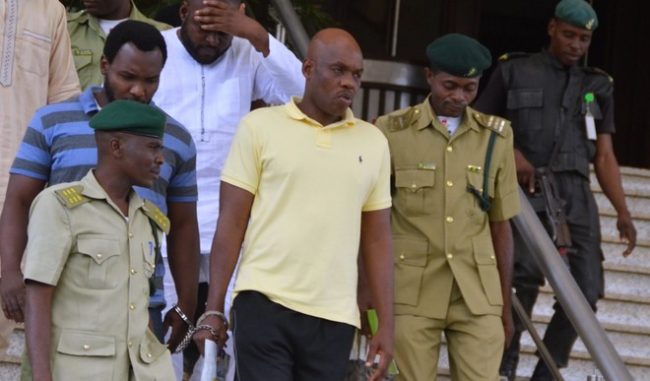Metro
Fate of the other Okah brother sealed by Nigerian court

The Federal High Court in Abuja Wednesday sentenced Charles Okah and his co-defendant, Obi Nwabueze, to life imprisonment for masterminding the Independence Day bombing which occurred in Abuja on October 1, 2010 and earlier in Warri, Delta State, on March 15 of the same year.
The two convicts were said to have planned the attacks with Charles’ elder brother, Henry Okah, the leader of the defunct Movement for the Emancipation of Niger Delta (MEND), who had been convicted of the same offences and sentenced to 24 years’ imprisonment by a South African court in 2013.
Justice Gabriel Kolawole, delivering judgment in the case which commenced on December 7, 2010, ruled that the prosecution proved the charges preferred against Charles and Nwabueze beyond reasonable doubt.
The two men were convicted and sentenced to life imprisonment as prescribed Sections 15(1) and (2) of the Economic and Financial Crimes Commission (Establishment) Act, 2004, under which they were charged.
Okah and Nwabueze, alongside Edmund Ebiware and Tiemkemfa Francis-Osvwo (aka General Gbokos) were first arraigned before the court on December 7, 2010 in connection with the 2010 Independence Day and Warri bomb blasts.
Read also: Senate takes stand on controversial bill proposing skirts for NYSC members
Francis-Osvwo died later in detention, while Ebiware, who had his trial conducted separately, was convicted on January 25, 2013 for the same set of offences and is currently serving a life sentence.
At least 12 persons were said to have died, with many others injured and property including cars burnt in the incident which occurred near Eagles Square in Abuja, venue of the Independence Day celebration, which was being presided over by then President Goodluck Jonathan.
This is coming barely two weeks after Charles’ elder brother, Henry Okah’s 24-year prison sentence and convictions were reinstated by a South African Constitutional Court on February 23, 2018. The court set aside the Supreme Court of Appeal’s order overturning the Warri bombing convictions, which led to a reduction in his sentence.
Henry Okah had originally been sentenced in March 2013 in the South Gauteng High Court after being convicted on 13 counts of terrorism, including engaging in terrorist activities, conspiracy to engage in terrorist activities, and delivering, placing and detonating an explosive device, relating to two car bombs detonated in Abuja, Nigeria, on October 1, 2010, the anniversary of Nigeria’s independence.
RipplesNigeria… without borders, without fears
Click here to join the Ripples Nigeria WhatsApp group for latest updates.
Join the conversation
Support Ripples Nigeria, hold up solutions journalism
Balanced, fearless journalism driven by data comes at huge financial costs.
As a media platform, we hold leadership accountable and will not trade the right to press freedom and free speech for a piece of cake.
If you like what we do, and are ready to uphold solutions journalism, kindly donate to the Ripples Nigeria cause.
Your support would help to ensure that citizens and institutions continue to have free access to credible and reliable information for societal development.






















